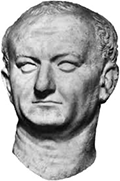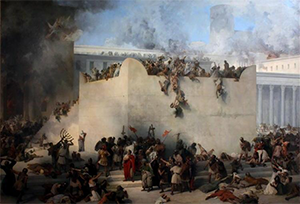The Roman Emperor Vespasian
Vespasian ruled the Roman Empire during the 1st Century, providing a strong hand and a steady influence after a time of upheaval. 
He was born on Nov. 17, 9, in Falacrinae, a village not far from Rome. The younger son, he followed in his father's and brother's footsteps and became a debt collector and then served in the military. He served for three years in Thracia and then went to Rome, where he had a civil job. His first taste of military success was commanding the second legion in the Roman invasion of Britain, in 43. He and his men succeeded in conquering southwest England. He also served in Germany and overall fought in dozens of battles and helped capture more than a dozen cities. He worked his way up the high government office ladder, the cursus honorum, reaching the mark of consul in 51. He also served as governor of Africa for a time; he was not a popular governor. The emperor Nero placed him in charge of putting down a large-scale Jewish revolt in Judea, in 66. He and his troops quelled that revolt. When Nero died, in 68, he left no established successor, and a series of strongmen seized the throne. This historians refer to as the Year of the Four Emperors. Vespasian–backed by the legions of Egypt, Judea, Syria, and the Danube–was the last of those four emperors, achieving a military victory over the emperor Vitellius in late December 69. He had sent troops to Italy and himself had captured the Egyptian city of Alexandria, cutting of Rome's grain supply. 
Even though Vespasian didn't take part in the victory over Vitellius and his soldiers, it was Vespasian whom the Roman Senate and people wanted to rule them. He was proclaimed emperor on Dec. 21, 69. By this time, he had married and had children, and he left his son Titus in charge in Judea. Titus finished the job, destroying the Jewish Temple in Jerusalem. Vespasian arrived in Rome in the summer of 70 and set about easing the difficulties caused by Nero's excesses and the struggles between the previous three emperors. He ordered the repair and reconstruction of many homes and other buildings that had been damaged or razed by the fires that had punctuated the brief civil wars. He restored order to the army, punishing those who had stepped out of line. Wanting to prevent further nationalist revolts such as yet another one that had occurred in Gaul in 70, he also discontinued the practice of having native commanders leading native troops in the provinces. Unlike his predecessors, he did not order the execution of whatever political enemies he might have had. 
He also restored viability to the royal treasury, removing certain tax exemptions and introducing new forms of revenue generation. He spent some of this money on new construction, including the Colosseum, and roads and other public works. He also spent money on education, funding schools and libraries and paying some teachers. Vespasian's son Titus had returned to Rome in 71 and served as his father's right hand, dictating letters, enacting policy, and protecting his father from plots against him. Vespasian died on June 23, 79. Titus succeeded him peacefully.
|
|
Social Studies for Kids
copyright 2002–2026
David White




